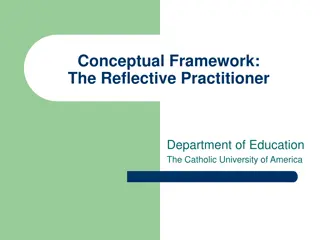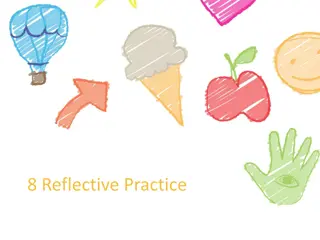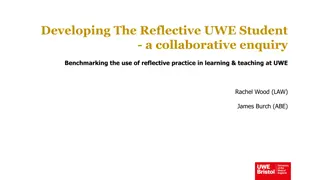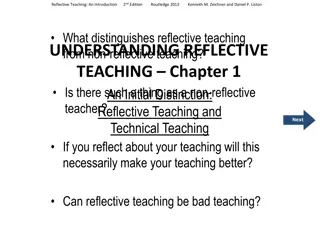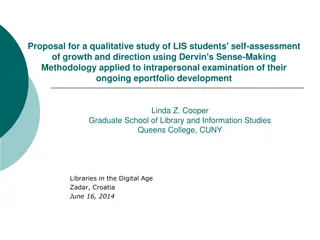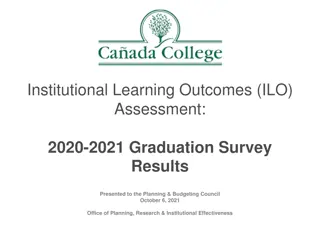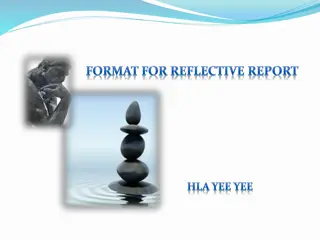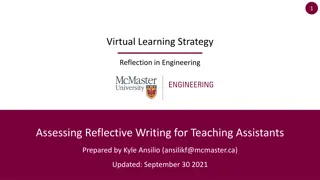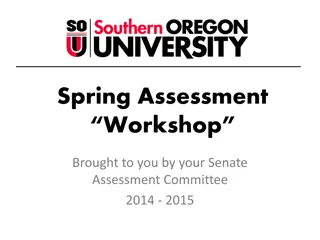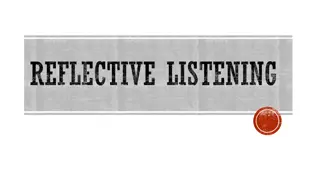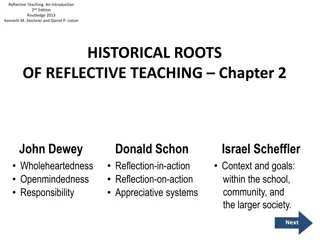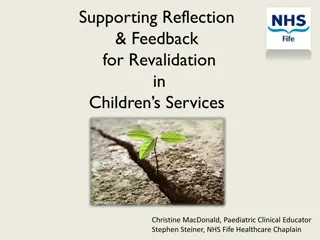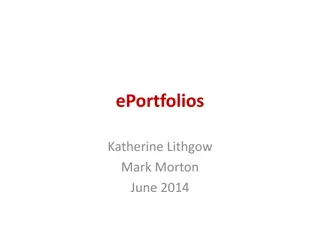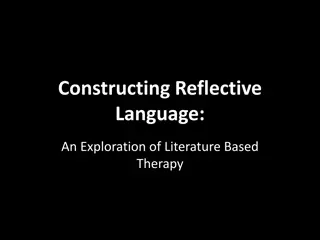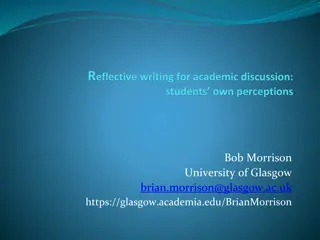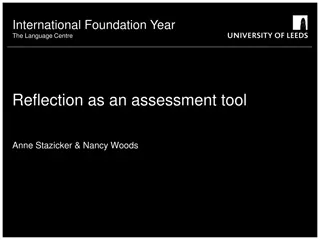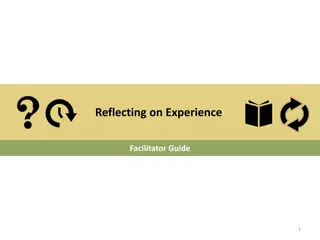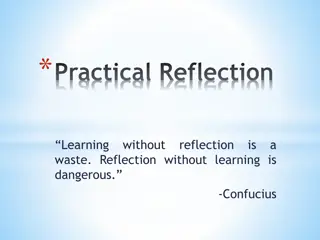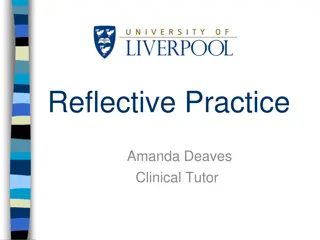Enhancing Reflective Practice Using Eportfolios
Reflective practice is a metacognitive process crucial for self-understanding and future action. Utilizing Eportfolios in teaching and assessing reflection helps trainees develop critical thinking skills. The session plan includes discussion on educator comments, exploring Eportfolios, and strategies to encourage reflection. Reflective practice, distinct from simple reflection, aids in practice development, performance improvement, and patient care quality enhancement. Emphasizing self-awareness is key to behavior change and professional growth through mentorship or peer engagement.
Download Presentation

Please find below an Image/Link to download the presentation.
The content on the website is provided AS IS for your information and personal use only. It may not be sold, licensed, or shared on other websites without obtaining consent from the author. Download presentation by click this link. If you encounter any issues during the download, it is possible that the publisher has removed the file from their server.
E N D
Presentation Transcript
Teaching and assessing reflective practice using the Eportfolio
Plan for session 9.30 10.00 Intro to assessing and teaching reflection 10.00- 10. 15 Small group discussion about educator comments 10.15- 10.45 Looking at Eportfolios in 2 s 10.45 11.00 coffee 11.00 11.15 Ideas for ways to encourage reflection in trainees. 11.15 11.45 Any other business
Why? Helps trainees develop thinking skills Trainers assessed via visits ( virtual or face to face)
Reflection is a metacognitive process that creates greater understanding of self and situations to inform future action Sandars definition demonstrates that the process of reflection is focused on the learner s thoughts and feelings as well as their ability to utilise this learning in future situations. Reflection is normally prompted by a complex problem or situation.
From OXVT3 - evidence in EPortfolio You are familiar and up to date with administrative and technical aspects of MRCGP including the ePortfolio and are actively involved in using the ePortfolio to the benefit of the GPStR You encourage your GPStR to direct their own learning and to develop self-awareness and critical thought evidenced by their full engagement with the ePortfolio in a timely way Undertake regular and frequent learning needs assessment of the GPStR and use this for both planning and modifying teacher
Reflective practice is often confused with reflection. However, it is not a contemplative state; rather, it is a challenging process that can often be best achieved by developing a relationship with peers or mentors. Educationally and developmentally, self- awareness is vital if there is to be any attempt at a behaviour change (Johnson and Bird 2006)
Purposes of reflection There are multiple purposes of reflection: To develop or to consolidate practice; To provide reassurance or criticality; To improve performance or understanding; To enhance the quality of patient care; To provide understanding of and respite from the complex, demanding workplace. Ref London Deanery Reflection and Reflective practice
Reflection theory Reflection Iterative What can I do differently, learning from the event Schon reflection on action Deep Thinking processes 5 Whys?
Research RCGP expect assessment of reflection in portfolio Want trainees to write good reflection I suspected this meant different things to different people
Consistency in the Assessments Grade Senior Educator n=23 Trainer n=22 Entry A Insufficient evidence 3 3 Needs Further 20 19 Development Competent 0 0 Excellent 0 0 Entry B Insufficient Evidence 0 0 Needs Further 6 6 Development Competent 16 13 Excellent 1 3
Inconsistent in Criteria Description: Pear shaped entry Learning: Evidence of learning that will influence future behaviour Feelings: How did they and others feel about Metacogntion /Critical Thinking: Narrative moving from description to analysis and synthesis of case and evaluation of outcome
Reflection is a skill not a style It is not innate in all doctors As educators we should be able to teach / develop it in trainees How?
Interaction through reflective writing How do you recognise good or bad reflection? How do you develop it in your comments?
Questions you might ask a trainee How well do you feel you dealt with the incident? (Evaluation) What would you want to do differently next time? (Evaluation) How did you feel about the patient while he was deferring the test? (Bring out emotions etc.) How did you feel about him after the event? (Bring out emotions etc.) Has this kind of thing happened before? (Review) Have you learned things from patients before, or seen their experiences from their perspectives like this before? (Review) What learning points arose from this case? (Identify) What follow up actions are you going to take? (Establish action) How will you gather feedback and evidence those actions? (Feedback)

 undefined
undefined



